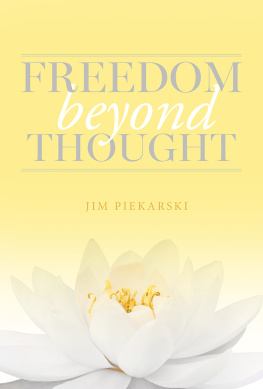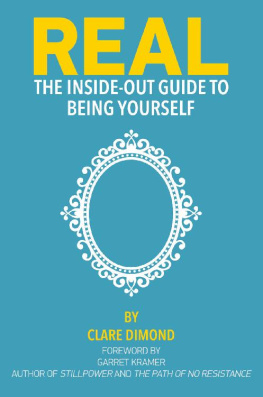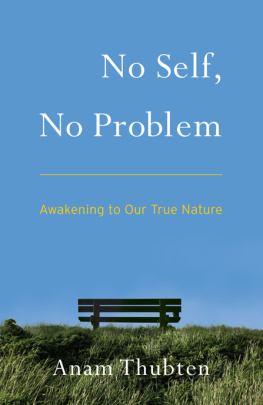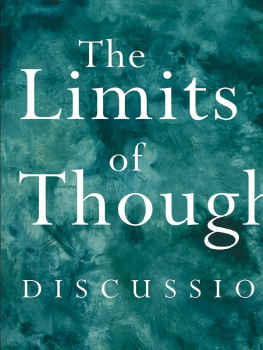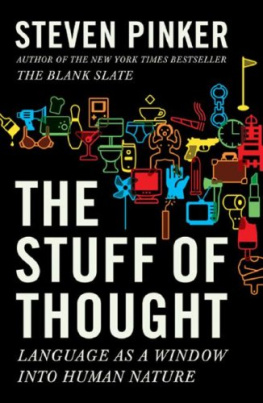
All rights reserved. No part of this publication may be reproduced, distributed, or transmitted in any form or by any means, including photocopying, recording, or other electronic or mechanical methods, without the prior written permission of the publisher, except in the case of brief quotations embodied in critical reviews and certain other noncommercial uses permitted by copyright law.
ISBN: 9781543990362
Table of Contents
Foreword
I would like to thank the many spiritual teachers that have taught me in person, through their writings or through videos. It is extremely unlikely that I could have progressed this far on my spiritual journey without their help and clarification. I would also like to thank Cynthia Ten-Eyck for going over this manuscript and helping to make it more readable. I would also like to thank the committed group of people at Venice Mindfulness Meditation and Blue Lotus Meditation Center for dialoguing with me and helping me to refine my understanding.
Introduction
The problem of human existence has engaged philosophers and religious people for millennia. Volumes have been written about how to improve the human condition, whether these are self-help books, political tracts, or spiritual texts. Very few of these efforts address the basic problem of human existence. Why do we suffer? Why are we cruel, greedy, and uncaring? However, a growing movement in the world addresses this problem directly. After years of study, meditation, and contemplation many, including myself, have concluded that the problem lies in not knowing ourselves for who we actually are. Very few people have any inkling of their True Nature.
Finding our True Nature is the gateway to freedom. Once found, it is a never-ending source of joy and peace in our lives. It is also the basis of great love and wisdom. However, most people do not understand the importance of realizing their true Self. Historically, only great spiritual and intuitive people were aware of the importance of uncovering this gem hidden within themselves. People had little education, and most did not have access to guidance that could point their True Nature out to them. The challenges of just surviving were so constant that spending time exploring these questions seemed impossible. But times have changed. Many people are recognizing their True Nature, and our global society makes it much easier to access the teachings of these people.
There are two basic worlds of experience available to human beings. One is the world of thought, and the other is a world that is beyond thought and offers us true happiness. Historically, there have been numerous names for these two worlds. The thought world has been deemed maya by the Hindus because it is the world of illusion. They contrasted this with moksha , which means the liberation from illusionenlightenment. Buddhists use the terms samsara , meaning delusion, and nirvana , meaning freedom from delusion. Some Christian philosophers contrast the animal soul with all its coarseness with the spiritual soul, our inherent connection to God. Other, more modern Christians refer to Christ consciousness as opposed to our normal, misguided consciousness. In modern terminology, we can name these two the worlds of thought and of awareness.
A general goal of this book is to translate historically profound spiritual teachings into language that is more in line with modern psychological and philosophical concepts. Hopefully, this will free the reader from terminology that is too foreign and from religious ideas that have no overlap with modern science.
The world of samsara or delusion is dependent on two factors. The first one is thought. There is a fundamental flaw in our relationship to thought that is responsible for our suffering and our lack of awareness. In the first part of the book we will explore how our limited understanding of our thinking process underlies our individual, social, and political problems.
In the second part of the book, we will see how our misunderstandings about thought give rise to the false self. Our mistaken assumption about who we are is the kingpin that keeps us from being happy and free of suffering.
The third part of the book focuses on our True Nature. It is challenging to discover our True Nature because all our habits of thinking point away from this realization. We are deeply conditioned by thought and its creation, the false self. Hopefully by exploring the reality behind the thought process and the false self, it will free the reader to see their own True Nature and realize the freedom that is the essence of every human being.
Chapter 1Thought: Our Most Dangerous Tool
If you could only teach one thing: moving beyond thought, cessation of thought as the basis for your life. Eckart Tolle in Becoming a Teacher of Presence, audio presentation.
The advent of toolmaking was a turning point in human evolution. Fashioning clubs, spears, pottery, and farming implements set humans on a new course of evolutionary experience. Ultimately the development of tools gave humans the capacity to spend less time on the onerous task of feeding and sheltering themselves. This tool-making capacity and the development of language are two of the ways that science distinguishes man from animals and humans from pre-humans.
Underlying our tool-making ability and language is our capacity to think. Making and using tools depends on our ability to discriminate among materials and imagine how they could be used. This capacity to think has become increasingly sophisticated over millennia; now we live in societies that would have been unimaginable to someone living two or three thousand years ago.
What defines a thing as a tool is its usefulness. If it is not useful, it is not a tool. With use comes the possibility of misuse, and every tool ever invented has the capacity to be misused.
The tool that is most useful and universal in our lives is thought. Thought is the ultra-toolthe most useful because it underlies the development of all other tools. Like all other tools, thought can be misused. Its capacity for misuse and its universality make it the most dangerous tool of all. The problems that stem from our misuse of thought may lead to our own extinction through war, climate change, overpopulation, or other means. Despite its creative and practical uses, danger lies in thoughts capacity to condition and mislead us. Because we are so easily awed by the products of our thinking, its easy for us to overlook the serious problems and limitations that come with its use. We think constantly throughout every daya frequency of use far more than any other tool. Yet most people have never seriously evaluated their own thinking.
The household tool that leads to the greatest number of serious injuries is the table saw. Not a chain saw or a nail guntools that appear on the surface to be more dangerous. A table saw is basically a flat, metal table with a 10-inch saw blade sticking up from below its surface. It is designed to make fairly precise cuts in wooden boards. It is dangerous because to make precise cuts the users hands must be very close to the spinning blade. It is easy, in a moment of inattention, to suffer a serious injury. The table saw is analogous to our use of thought. It is more dangerous than it looks, and working so intimately with it increases our vulnerability to its dangers.
It is vital that we attend to thought and find its proper place as a tool. For most people thought has lost its proper place. It is no longer just a tool it has become our master, and is directly implicated in all the suffering, confusion, and conflict of humankind. We can easily see the destructiveness of thought in the fields of religion and politics. Extreme ideological positions in these areas are responsible for millions of deaths per decade. Some notable examples of ideological extremes are: Pol Pot killing millions of his own people because he believed in the elimination of those who were intellectual or highly educated; Hitler killing millions he saw as racially impure; the Catholic Church torturing and killing thousands in the Inquisition who did not share their religious dogma. There are many examples from history, but all these examples have a common threadpeople with power cherished their ideology more than they did human life.
Next page
